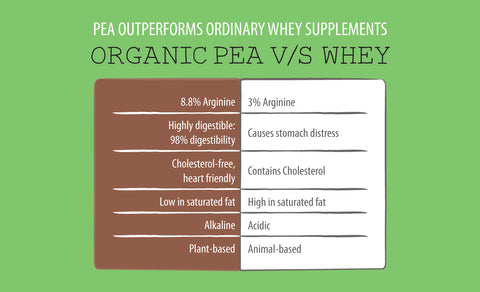What is the best protein powder for GERD?
Pea Protein is the best protein powder for GERD because it is made with 100% real peas. Our products are free from additives, fillers or anything artificial which is clean and prevents any plausible cause of GERD. Ingredients like these are not only better for you, but also better for the environment.
What is GERD?
You have probably heard of acid reflux, or gastroesophageal reflux (GER), which is the backward flow of stomach acid into the esophagus. What you may not have heard, however, is that severe acid reflux can lead to gastroesophageal reflux disease, or GERD.
GERD is a common disease that affects about 20% of the population, and the most common symptom is frequent heartburn. Foods known to trigger heartburn delay the digestive process, letting food sit in the stomach longer. They also cause the esophageal sphincter to relax, which is what allows stomach acid to back up (reflux) into the esophagus.
Eliminating certain foods from your diet is one of the best ways to mitigate GERD symptoms. An elimination diet can also be used to learn whether or not certain foods cause or aggravate your symptoms. This is important because every stomach is different. A food that causes GERD symptoms for one person may not cause them for someone else. It follows that there is considerable controversy over which foods actually cause symptoms. That said, there are a few foods that everyone agrees are common triggers. Here is what to avoid when buying protein powder.

Avoid dairy.
Dairy-based protein powders can cause acid reflux. Common dairy-based protein powders include casein and whey protein powder, both of which are byproducts of cheese and yogurt production. If your casein or whey protein powder causes acne or stomach pain, it is time to look for a new protein powder. Fortunately, going dairy-free is easier than ever. Unfortunately, not all dairy-free protein powders are created equal.

Avoid food additives.
Most dairy-free protein powders are full of food additives. Although they are not necessarily bad for you in small quantities, food additives can add up quickly, especially if you drink a protein shake every day. At higher quantities, food additives can cause nasty side effects.
Essentially, because food additives are heavily processed, some people have trouble digesting them. They sit in our stomachs for longer, which can increase the likelihood that the stomach contents to flow back into the esophagus. This also gives the trillions of bacteria in our guts have more time to eat and release gas, which puts pressure on the lower esophageal sphincter (LES), the valve that separates the stomach from the esophagus. Over time, the LES can weaken and allow the stomach contents to flow back into the esophagus.
What exactly are food additives?
As a rule of thumb, food additives are ingredients that you cannot pronounce. Not sure what to look for? Here is a list of the most food common additives in protein powder:
acacia gum, acesulfame potassium, artificial flavors, aspartame, carrageenan, cellulose gum, dextrin, dextrose, gellan gum, guar gum, gum arabic, locust bean gum, maltodextrin, rice syrup solids, silica, sucralose, xanthan gum, xylitol, etc.
Go Original or Unflavoured.
As a rule of thumb, if you have sensitivities that you are unsure of that may be causing you GERD, by way of elimination to identify the source is one the best ways to know your body better.
Many of our customers choose our Original Pea or Soy that is unflavored, unadulterated and nothing artificial to help them live a bloat free life.
Reference:
https://www.webmd.com/heartburn-gerd/guide/reflux-disease-gerd-1
Khoshoo V, Zembo M, King A, Dhar M, Reifen R, Pencharz P. Incidence of gastroesophageal reflux with whey- and casein-based formulas in infants and in children with severe neurological impairment. J Pediatr Gastroenterol Nutr. 1996 Jan;22(1):48-55. doi: 10.1097/00005176-199601000-00008. PMID: 8788287.
https://www.drinkwholesome.com/the-best-protein-powder-for-gerd/
https://thesurgicalclinics.com/8-foods-bad-for-gerd/#:~:text=Milk%20and%20dairy%20products%20are,the%20lower%20esophageal%20sphincter's%20function.
https://www.gerdhelp.com/blog/gerd-diet-what-foods-to-limit-or-avoid/
Farahmand F, Najafi M, Ataee P, Modarresi V, Shahraki T, Rezaei N. Cow's Milk Allergy among Children with Gastroesophageal Reflux Disease. Gut Liver. 2011;5(3):298-301. doi:10.5009/gnl.2011.5.3.298




